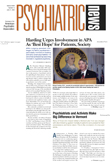A new survey of graduating residents in New York state finds that there is great demand for psychiatrists fresh out of training programs in that state.
In particular, child and adolescent psychiatrists finishing programs in New York received more job offers than any of their physician colleagues did.
Researchers from the Center for Health Workforce Studies, which is based at the State University of New York at Albany, surveyed residents from 27 medical specialties graduating from programs in New York in spring 2001. They did so with the help of training directors and graduate medical education directors in university programs and hospitals across the state. They released their results in May.
The researchers surveyed 4,407 medical residents in the final months of training and received 2,845 responses, for a 65 percent response rate. Among the respondents were 186 psychiatry residents, including 123 adult and 38 child psychiatrists. (The remaining respondents were in a variety of psychiatry subspecialty programs.)
The findings provide a snapshot of graduating residents in New York. Researchers asked residents about their demographics, views of the job market, and practice plans.
The survey showed that 44 percent of psychiatry respondents were women. There was a significant proportion of international medical graduates (IMGs), 63 percent, and 24 percent of them held temporary J-1 visas, which require that the physician return to his or her country of origin after training.
Overall, psychiatry residents exiting programs in New York fared well in terms of career prospects. In particular, child and adolescent psychiatrists in New York had the highest mean number of job offers, with 5.4 per person. Residents completing adult psychiatry programs in New York received an average of 3.5 job offers each. Pathologists, in contrast, received only 1.6 job offers each, ranking last in this respect.
Researchers asked residents to rate their perceptions of the national job market on a scale of -2 (no jobs on the national market) to +2 (many jobs on the market).
Adult psychiatry residents in New York gave the national job market high marks (1.9), while child and adolescent psychiatrists felt nearly the same (1.8). Physicians in general surgery expressed the most pessimistic views of the national job market, giving it a score of .73.
Other results from the survey were not as encouraging, however. Psychiatrists who had secured postresidency work reported that they expected to earn what they considered to be relatively low starting salaries. The expected median starting income for adult psychiatrists in New York last year was $120,000, while child and adolescent psychiatrists expected to earn $116,000 annually. Only primary care physicians reported a lower starting income than psychiatrists. Primary care physicians expected to make $109,500 after completing residency training. Radiologists in New York reported expecting the highest starting annual wages. They expected to earn $186,000.
Edward Salsberg, M.P.A., executive director of the center, predicted that salaries for psychiatrists will increase along with demand for their services.
“Even if you train the best psychiatrists in the world, if you don’t train enough of them, you will have serious problems with access to care,” he told Psychiatric News. “In particular, marketplace demand indicates that this country can use more child psychiatrists.”
The high percentage of IMGs in New York psychiatry residency programs reinforced for Sidney Weissman, M.D., a former member of APA’s Committee on Workforce Issues, the vital role that IMGs play in that state. “In the absence of IMGs, health care in New York would grind to a halt,” he told Psychiatric News.
Weissman said that while the survey results show that psychiatrists receive a relatively high number of job offers compared with other specialists, the nature of these jobs is not known. “It is true that every psychiatrist I know who graduates is employed—the question is, Do they like their jobs?”
Weissman said it would be useful to gather information on the nature of the employment opportunities for early career psychiatrists. He suspects that the majority of job offers reflected in the New York survey are in the public sector, where the psychiatrists’ chief responsibility is medication management.
“While there may be no shortage of jobs, these jobs may not be desirable for those psychiatrists who want to practice psychotherapy, for instance,” Weissman said. “These data warrant further investigation on the quality and number of jobs available to psychiatrists.”
A copy of the report is posted on the Web site of the Center for Health Workforce Studies at chws.albany.edu. ▪
